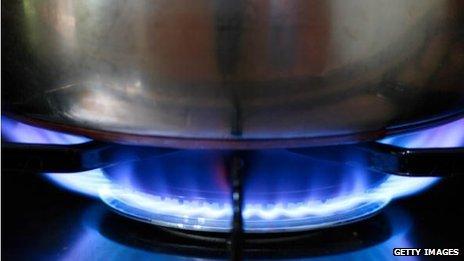Should British Gas be dismantled?
- Published
- comments

The energy minister's letters to the assorted competition and energy regulators is a masterpiece of iron fist in velvet glove.
Naturally Ed Davey understands the annual energy market assessment being carried out by Ofgem, the Office of Fair Trading and the Competition and Markets Authority must be "independent". And the regulatory troika must feel it can "recommend any of a range of things, ranging from no action to a full market investigation reference".
But he just wants to remind them of a few things which he would love them to "focus on" because they "could have significant benefit for the consumer".
It is his first point that will probably make greatest waves, especially in the City, because he implies that British Gas - in his view - has excessive market power, is able to charge too much for gas and should perhaps be dismantled.
'Potential remedies'
The way he puts it is to wonder whether there is merit in a market investigation reference "with the whole gamut of potential remedies that could follow, including a break up of any companies found to have monopoly power to the detriment of the consumer".
So what is the basis of this musing on the possible cleaving of the biggest gas supplier, British Gas, owned by Centrica? (Mr Davey helpfully reminds the watchdogs that Centrica has 41% of the gas market, compared with 16% for its nearest rival, SSE).
Well Mr Davey cites financial information that has been published for a few years, which shows that the ratio of the profits made by British Gas as a percentage of its gas sales - what is known as the domestic gas supply margin - has consistently been the highest or almost the highest of the big energy companies.
So in 2009 British Gas's margin on supplying gas to homes was a positive 7.4%, when all its main rivals were in losses.
And the following year the margin was 10.6%, the highest by far.
In 2011 and 2012, British Gas's margins were 8.1% and 11.2%, the third and second fattest of the big suppliers in those years.
'Volatile trade'
Now as Mr Davey points out, these are significantly higher margins than those earned by - for example - the big supermarket companies on their sales of everything from baked beans to knickers.
Which would be justifiable if there were much greater risks associated with selling gas than with retailing most of the material basics and luxuries of life.
But Mr Davey points out that being Tesco or Sainsbury is not conspicuously a less volatile trade than being British Gas.
And he also questions whether there is any justification for the gas supply margin being three or four times the electricity supply margin: it is true, as he says, that demand for gas is more unpredictable than for electricity, because of the impact of unforecastable weather; but it is easier to store gas than electricity, and thus to hedge against swings in demand.
All of which may look like a solid case for cutting British Gas down to size.
Except:
1) Mr Davey's analysis is based on information that Ofgem has been receiving and publishing for years. And if it proves that British Gas has excessive market power, why on earth didn't Ofgem start taking action against British Gas months and years ago - or at least publicly complain about British Gas's supposedly unjustifiable profits?
2) It must be relevant that in 2011 and 2012, the two biggest Scottish companies, SSE and Scottish Power, had bigger or comparable gas profit margins.
3) British Gas's profit margin is only a bit bigger than its rivals on the basis of blending gas and electricity margins - and the company's margin has been narrowing, including in 2013.
None of which is to prove that British Gas isn't a bit over-mighty. But it does suggest that the case for breaking it up is not a statement of the overwhelmingly bloomin' obvious.